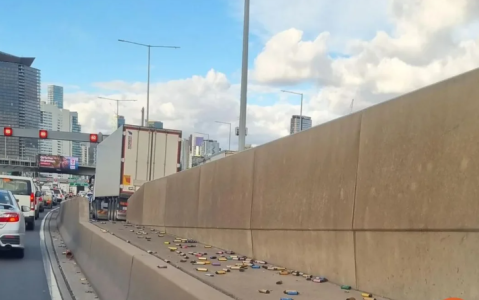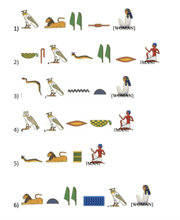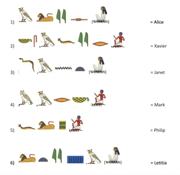Bizarre habit piling up on major road sparks calls for cameras and $400 fine
You might have thought you'd seen it all on our roads, but a bizarre – and illegal – new roadside trend in one city has even seasoned drivers shaking their heads.
Along the busy West Gate Freeway in Melbourne, as you approach the city, a “vape wall” has emerged – a line of brightly colored disposable e-cigarette cartridges piling up on the concrete median. Dozens of used vapes have been carelessly tossed out of car windows, collecting against the barrier in plain view of passing motorists. It’s a sight that’s equal parts perplexing and infuriating, and it’s prompting outraged Melburnians to demand action.
One driver recently snapped a photo of the mess and shared it online, where it quickly gained attention. The image showed multicoloured vapes strewn along the freeway divider, an unsightly rainbow of litter that some locals say has been growing for months. Reactions poured in fast.
“Is it that hard to put it in your pocket and dispose of it properly?” one exasperated Aussie asked, calling the view “disgusting”. Others wondered if a single serial offender was responsible or if “a community of a*******” (to put it politely) were all contributing to the pile-up.
Either way, there’s no question the Great West Gate Vape Dump is striking a nerve – and not just because it looks gross, but because of what it says about our habits and attitudes.
For many older Australians, the scene is almost surreal. Not so long ago, the common roadside rubbish might have been cigarette butts, beer cans, or Macca’s wrappers. Now it’s disposable vapes, the trendy e-cigarettes often used once and tossed.
The West Gate Freeway’s new decoration has sparked a flurry of commentary, both amused and angry. Some have even jokingly dubbed it the "Melbourne Vape Shrine" on social media, though there’s nothing sacred about this shrine – it’s pure rubbish.
Observers note that the location isn’t random. The vapes tend to appear near a merge and slow traffic area, meaning drivers likely chuck their spent vape out the window when traffic stalls or as they approach the city. Perhaps they think no one will notice, or maybe they don’t want the evidence in their car when they reach their destination.
Whatever the reason, it’s clearly become a habit for multiple motorists – a habit that comes with a hefty price tag if they’re caught. In Victoria, littering from a vehicle is illegal, with a fine of $407 for individuals (and over $800 if it’s something dangerous like a lit cigarette). Each of those little plastic vape sticks might only cost $20-$30 to buy, but drop one on the road and you could be hit with a $407 penalty – a costly flick of the wrist!
Local residents and commuters are livid. On the Reddit post that brought the issue to light, one commenter fumed, “This is gross, clean this up. Fine the people doing this.” – a sentiment that quickly garnered hundreds of upvotes. Another remarked, “Vapists are like smokers and have absolutely no respect for the environment around them,” equating the act to the old cigarette-butt tossing days. The frustration is palpable: after decades of anti-litter campaigns and instilling the “Do the right thing” mantra, seeing this kind of blatant disregard has people shaking their heads in disappointment. What ever happened to personal responsibility?
To be fair, littering on highways isn’t a new phenomenon. Longtime drivers might recall seeing other peculiar rubbish build-ups in certain spots – a heap of coffee cups where morning commuters hit the brakes, or a nest of drink cans at a known traffic bottleneck. Bad habits die hard. But this “vape wall” feels especially symbolic of our times: a collision of new technology, disposable consumer culture, and old-fashioned laziness. It’s the 2020s in a nutshell – high-tech gadgets meant to deliver a nicotine hit, tossed out the window like any old garbage.
Part of the reason this vape litter problem even exists is the explosive rise of vaping in Australia over the past few years. Traditional smoking has been on the decline, but vaping has surged, especially among younger people. The Australian Association of Convenience Stores reports a staggering 349% increase in adult vapers over five years. E-cigarettes – often brightly flavoured with names like blue raspberry or cola – have attracted a new generation of users, with teenagers and twentysomethings more likely to vape than older folks. Social media trends helped popularise it, and many picked up vaping, thinking it was a “safer” or cleaner alternative to smoking.
Source: 7NEWS Australia / YouTube
But here’s the irony: while vaping was marketed as a cleaner habit (no ash, no cigarette butts, no smoke), disposable vapes come with their own dirty footprint. The devices are plastic and metal gadgets with lithium-ion batteries inside – essentially electronic waste. According to environmental experts, those materials can take hundreds of years to decompose and may leach harmful chemicals into soil and water. Every vape pen tossed onto the roadside is not just an eyesore; it’s a little toxic time capsule sitting there. And if mowers or cars damage the batteries, they could even spark fires. In fact, authorities warn that discarded vapes pose a fire hazard and can release microplastics and chemicals into waterways if left to rot.
Australia is already drowning in waste – an estimated 75.8 million tonnes of waste each year – and these single-use vapes are adding to the pile. Unlike a paper coffee cup that (eventually) breaks down, a vape device is electronic garbage. Properly recycling them is possible, but how many people actually recycle their vapes? Instead, we’re literally seeing the evidence accumulating on freeway barriers.
This isn’t just a Melbourne problem either. With vaping’s popularity, one can imagine similar litter popping up elsewhere. In the UK, for instance, millions of disposable vapes are thrown away each week, creating an e-waste nightmare. It’s a classic case of a modern convenience leading to an unforeseen environmental headache. And it all plays out in living colour on the side of the West Gate Freeway, for every passing driver (and their horrified passengers) to see.
Health experts, meanwhile, are concerned about what the vaping trend means for public health – but here on the freeway, we’re witnessing the environmental health impact in real time. The federal government has started to crack down on vaping: from January 1 this year, importing single-use vapes was banned in Australia, part of a push to curb their availability. (Many of those discarded vapes likely pre-date the ban or have been smuggled in illegally, as the black market is still thriving.) Prime Minister Anthony Albanese has made it clear he’s “not remotely interested” in vaping and is alarmed by the damage it can do to people’s health. But even as those policies take effect, we’re left to deal with literal piles of the problem left over in the wild.
So what can be done about our vape-tossing freeway litterbugs? Victoria’s Environment Protection Authority already allows citizens to report littering from vehicles – if you catch someone in the act (and can note their license plate), they can be fined without a police officer present. But realistically, in fast-moving freeway traffic, how many offenders get reported? The sheer number of vapes on the West Gate suggests that almost nobody is getting caught. The offenders likely assume they’re anonymous in the flow of traffic – and so far, they’re right.
That’s why some frustrated Melburnians are calling for new “litter cams” to be installed along such hotspots to catch perpetrators. It might sound extreme, but it’s already happening in some places.
In Brisbane, for example, the city council has deployed covert surveillance cameras to nab litterers at known dumping locations. The program has up to 30 hidden cameras (camouflaged in trees and street signs), and it’s been effective: 111 fines were issued in one recent year to people caught tossing rubbish (with a $322 fine each for individuals). The cameras have caught all sorts of sneaky behaviour – from people dumping bags of garbage to, amusingly, a couple who got frisky in a car but ended up fined for the litter they left behind rather than their other antics.
Encouraged by this success, a Brisbane councillor, Sarah Hutton, said the approach is necessary to protect the city’s environment and lifestyle. “Our message is simple: if you’re thinking of dumping rubbish because nobody’s looking, you will get caught and face the consequences,” she warned. The implication is clear: Big Brother might be watching that vape flick.
However, not everyone is thrilled about the idea of more surveillance. Civil liberties advocates question if installing cameras for littering is a step too far. “Surveillance was justified originally by fighting terrorism or violent crime… we do not see it justified for catching people who are littering,” argued Michael Cope of Queensland’s Council for Civil Liberties. It’s a valid point – do we really want to live in a society where every bad driver habit is recorded and fined? Then again, ask the average commuter stuck next to a pile of soggy vape pens on their morning drive, and they might very well say, “Fine them all, I don’t care how you do it!”
On the enforcement front, the Victorian government could also consider simpler measures. Perhaps installing prominent signage on the West Gate Freeway reminding drivers of the $407 littering fine (basically a “Don’t throw your vapes – or $407 – out the window” message).
Some have suggested offering disposable vape drop-off bins at service stations or turn-offs, though it’s debatable if the kind of person who litters would use them. Community clean-up efforts could at least remove the existing eyesore – a group of volunteers or an EPA crew armed with gloves and grabbers could clear the “vape wall” in an afternoon – but that treats the symptom, not the cause. The cause, in this case, is human behaviour: a mix of convenience, thoughtlessness, and the assumption that “someone else will deal with my trash.”
It does come down to personal responsibility. One irate commenter online put it bluntly: some people are “too bone idle and lazy”, thinking it’s easier to chuck rubbish on the ground than wait to bin it – but if you “hit their hip pocket” with fines, they might think twice. This is the classic carrot-and-stick of litter enforcement: education and appeals to civic duty on one hand, and fines and enforcement on the other. Right now, it seems the stick might be needed – perhaps literally camera sticks perched above the freeway – to catch these vape-tossers in the act.
Beyond the immediate mess on the freeway, there’s a broader conversation here about what kind of community we want to be. Australia once led big public campaigns against littering (who can forget “Keep Australia Beautiful” and “Do the Right Thing”?). Most of us take pride in our country’s natural beauty and clean streets. Seeing a rainbow trail of discarded vapes along a major road feels like a step backward, like a small defeat for those values of cleanliness and respect. It’s also a wake-up call about the unintended consequences of new trends: we embraced vaping (for better or worse), and now we’re dealing with vape pollution on top of everything else.
The Victorian Department of Transport has been made aware of the issue, and we’ll see if any official response comes – maybe increased litter patrols or even looking into those camera solutions. Meanwhile, community pressure is mounting for something to be done. The story has resonated especially with older Australians who remember fighting the good fight against litterbugs in the past. There’s an almost nostalgic frustration: “Didn’t we teach people not to toss rubbish out of the car back in the ‘80s? Do we have to teach it all over again to a new generation?”
As we watch how this situation unfolds, one thing is clear: the “vape wall” on West Gate Freeway can’t be ignored for much longer. Whether through fines, cameras, public shaming, or old-fashioned clean-up crews, it needs to come down. The whole saga might end up being a useful example – for vape users and non-vapers alike – that little actions have big impacts. In an era of climate and environmental challenges, something as small as how you dispose of a vape actually does matter.
And so, dear readers, the next time you see someone casually flick a piece of rubbish from their car, remember the West Gate vape wall and speak up (if it’s safe to do so) or report it. We all have to breathe the same air, drive the same roads, and look at the same scenery. No one wants that scenery to include piles of plastic and batteries accumulating by our highways.

It might be vapes today and something else tomorrow – the core issue is respect. Do we respect our shared spaces enough to keep them clean, or do we need Big Brother watching to make us behave? It’s a question worth asking as we grapple with this strange new litter trend. After all, shouldn’t doing the right thing come from within, not just from the fear of a $407 fine or a hidden camera?
So what do you think – are more surveillance and fines the way to stop this gross habit, or is it high time we all just took responsibility for our own rubbish?
READ MORE: A 'hidden' price pinch could quietly hit your wallets this week! Are you ready to pump out extra cash?
Along the busy West Gate Freeway in Melbourne, as you approach the city, a “vape wall” has emerged – a line of brightly colored disposable e-cigarette cartridges piling up on the concrete median. Dozens of used vapes have been carelessly tossed out of car windows, collecting against the barrier in plain view of passing motorists. It’s a sight that’s equal parts perplexing and infuriating, and it’s prompting outraged Melburnians to demand action.
One driver recently snapped a photo of the mess and shared it online, where it quickly gained attention. The image showed multicoloured vapes strewn along the freeway divider, an unsightly rainbow of litter that some locals say has been growing for months. Reactions poured in fast.
“Is it that hard to put it in your pocket and dispose of it properly?” one exasperated Aussie asked, calling the view “disgusting”. Others wondered if a single serial offender was responsible or if “a community of a*******” (to put it politely) were all contributing to the pile-up.
Either way, there’s no question the Great West Gate Vape Dump is striking a nerve – and not just because it looks gross, but because of what it says about our habits and attitudes.
The 'Vape Wall' Shocks Melbourne
For many older Australians, the scene is almost surreal. Not so long ago, the common roadside rubbish might have been cigarette butts, beer cans, or Macca’s wrappers. Now it’s disposable vapes, the trendy e-cigarettes often used once and tossed.
The West Gate Freeway’s new decoration has sparked a flurry of commentary, both amused and angry. Some have even jokingly dubbed it the "Melbourne Vape Shrine" on social media, though there’s nothing sacred about this shrine – it’s pure rubbish.
Observers note that the location isn’t random. The vapes tend to appear near a merge and slow traffic area, meaning drivers likely chuck their spent vape out the window when traffic stalls or as they approach the city. Perhaps they think no one will notice, or maybe they don’t want the evidence in their car when they reach their destination.
Whatever the reason, it’s clearly become a habit for multiple motorists – a habit that comes with a hefty price tag if they’re caught. In Victoria, littering from a vehicle is illegal, with a fine of $407 for individuals (and over $800 if it’s something dangerous like a lit cigarette). Each of those little plastic vape sticks might only cost $20-$30 to buy, but drop one on the road and you could be hit with a $407 penalty – a costly flick of the wrist!
Local residents and commuters are livid. On the Reddit post that brought the issue to light, one commenter fumed, “This is gross, clean this up. Fine the people doing this.” – a sentiment that quickly garnered hundreds of upvotes. Another remarked, “Vapists are like smokers and have absolutely no respect for the environment around them,” equating the act to the old cigarette-butt tossing days. The frustration is palpable: after decades of anti-litter campaigns and instilling the “Do the right thing” mantra, seeing this kind of blatant disregard has people shaking their heads in disappointment. What ever happened to personal responsibility?
To be fair, littering on highways isn’t a new phenomenon. Longtime drivers might recall seeing other peculiar rubbish build-ups in certain spots – a heap of coffee cups where morning commuters hit the brakes, or a nest of drink cans at a known traffic bottleneck. Bad habits die hard. But this “vape wall” feels especially symbolic of our times: a collision of new technology, disposable consumer culture, and old-fashioned laziness. It’s the 2020s in a nutshell – high-tech gadgets meant to deliver a nicotine hit, tossed out the window like any old garbage.
Vaping Boom Meets Disposable Culture
Part of the reason this vape litter problem even exists is the explosive rise of vaping in Australia over the past few years. Traditional smoking has been on the decline, but vaping has surged, especially among younger people. The Australian Association of Convenience Stores reports a staggering 349% increase in adult vapers over five years. E-cigarettes – often brightly flavoured with names like blue raspberry or cola – have attracted a new generation of users, with teenagers and twentysomethings more likely to vape than older folks. Social media trends helped popularise it, and many picked up vaping, thinking it was a “safer” or cleaner alternative to smoking.
Source: 7NEWS Australia / YouTube
But here’s the irony: while vaping was marketed as a cleaner habit (no ash, no cigarette butts, no smoke), disposable vapes come with their own dirty footprint. The devices are plastic and metal gadgets with lithium-ion batteries inside – essentially electronic waste. According to environmental experts, those materials can take hundreds of years to decompose and may leach harmful chemicals into soil and water. Every vape pen tossed onto the roadside is not just an eyesore; it’s a little toxic time capsule sitting there. And if mowers or cars damage the batteries, they could even spark fires. In fact, authorities warn that discarded vapes pose a fire hazard and can release microplastics and chemicals into waterways if left to rot.
Australia is already drowning in waste – an estimated 75.8 million tonnes of waste each year – and these single-use vapes are adding to the pile. Unlike a paper coffee cup that (eventually) breaks down, a vape device is electronic garbage. Properly recycling them is possible, but how many people actually recycle their vapes? Instead, we’re literally seeing the evidence accumulating on freeway barriers.
This isn’t just a Melbourne problem either. With vaping’s popularity, one can imagine similar litter popping up elsewhere. In the UK, for instance, millions of disposable vapes are thrown away each week, creating an e-waste nightmare. It’s a classic case of a modern convenience leading to an unforeseen environmental headache. And it all plays out in living colour on the side of the West Gate Freeway, for every passing driver (and their horrified passengers) to see.
Health experts, meanwhile, are concerned about what the vaping trend means for public health – but here on the freeway, we’re witnessing the environmental health impact in real time. The federal government has started to crack down on vaping: from January 1 this year, importing single-use vapes was banned in Australia, part of a push to curb their availability. (Many of those discarded vapes likely pre-date the ban or have been smuggled in illegally, as the black market is still thriving.) Prime Minister Anthony Albanese has made it clear he’s “not remotely interested” in vaping and is alarmed by the damage it can do to people’s health. But even as those policies take effect, we’re left to deal with literal piles of the problem left over in the wild.
Fines, Cameras, and Cracking Down
So what can be done about our vape-tossing freeway litterbugs? Victoria’s Environment Protection Authority already allows citizens to report littering from vehicles – if you catch someone in the act (and can note their license plate), they can be fined without a police officer present. But realistically, in fast-moving freeway traffic, how many offenders get reported? The sheer number of vapes on the West Gate suggests that almost nobody is getting caught. The offenders likely assume they’re anonymous in the flow of traffic – and so far, they’re right.
That’s why some frustrated Melburnians are calling for new “litter cams” to be installed along such hotspots to catch perpetrators. It might sound extreme, but it’s already happening in some places.
In Brisbane, for example, the city council has deployed covert surveillance cameras to nab litterers at known dumping locations. The program has up to 30 hidden cameras (camouflaged in trees and street signs), and it’s been effective: 111 fines were issued in one recent year to people caught tossing rubbish (with a $322 fine each for individuals). The cameras have caught all sorts of sneaky behaviour – from people dumping bags of garbage to, amusingly, a couple who got frisky in a car but ended up fined for the litter they left behind rather than their other antics.
Encouraged by this success, a Brisbane councillor, Sarah Hutton, said the approach is necessary to protect the city’s environment and lifestyle. “Our message is simple: if you’re thinking of dumping rubbish because nobody’s looking, you will get caught and face the consequences,” she warned. The implication is clear: Big Brother might be watching that vape flick.
However, not everyone is thrilled about the idea of more surveillance. Civil liberties advocates question if installing cameras for littering is a step too far. “Surveillance was justified originally by fighting terrorism or violent crime… we do not see it justified for catching people who are littering,” argued Michael Cope of Queensland’s Council for Civil Liberties. It’s a valid point – do we really want to live in a society where every bad driver habit is recorded and fined? Then again, ask the average commuter stuck next to a pile of soggy vape pens on their morning drive, and they might very well say, “Fine them all, I don’t care how you do it!”
On the enforcement front, the Victorian government could also consider simpler measures. Perhaps installing prominent signage on the West Gate Freeway reminding drivers of the $407 littering fine (basically a “Don’t throw your vapes – or $407 – out the window” message).
Some have suggested offering disposable vape drop-off bins at service stations or turn-offs, though it’s debatable if the kind of person who litters would use them. Community clean-up efforts could at least remove the existing eyesore – a group of volunteers or an EPA crew armed with gloves and grabbers could clear the “vape wall” in an afternoon – but that treats the symptom, not the cause. The cause, in this case, is human behaviour: a mix of convenience, thoughtlessness, and the assumption that “someone else will deal with my trash.”
It does come down to personal responsibility. One irate commenter online put it bluntly: some people are “too bone idle and lazy”, thinking it’s easier to chuck rubbish on the ground than wait to bin it – but if you “hit their hip pocket” with fines, they might think twice. This is the classic carrot-and-stick of litter enforcement: education and appeals to civic duty on one hand, and fines and enforcement on the other. Right now, it seems the stick might be needed – perhaps literally camera sticks perched above the freeway – to catch these vape-tossers in the act.
Time to Clean Up Our Act
Beyond the immediate mess on the freeway, there’s a broader conversation here about what kind of community we want to be. Australia once led big public campaigns against littering (who can forget “Keep Australia Beautiful” and “Do the Right Thing”?). Most of us take pride in our country’s natural beauty and clean streets. Seeing a rainbow trail of discarded vapes along a major road feels like a step backward, like a small defeat for those values of cleanliness and respect. It’s also a wake-up call about the unintended consequences of new trends: we embraced vaping (for better or worse), and now we’re dealing with vape pollution on top of everything else.
The Victorian Department of Transport has been made aware of the issue, and we’ll see if any official response comes – maybe increased litter patrols or even looking into those camera solutions. Meanwhile, community pressure is mounting for something to be done. The story has resonated especially with older Australians who remember fighting the good fight against litterbugs in the past. There’s an almost nostalgic frustration: “Didn’t we teach people not to toss rubbish out of the car back in the ‘80s? Do we have to teach it all over again to a new generation?”
As we watch how this situation unfolds, one thing is clear: the “vape wall” on West Gate Freeway can’t be ignored for much longer. Whether through fines, cameras, public shaming, or old-fashioned clean-up crews, it needs to come down. The whole saga might end up being a useful example – for vape users and non-vapers alike – that little actions have big impacts. In an era of climate and environmental challenges, something as small as how you dispose of a vape actually does matter.
And so, dear readers, the next time you see someone casually flick a piece of rubbish from their car, remember the West Gate vape wall and speak up (if it’s safe to do so) or report it. We all have to breathe the same air, drive the same roads, and look at the same scenery. No one wants that scenery to include piles of plastic and batteries accumulating by our highways.
Key Takeaways
- Vapes as Litter: Drivers in Melbourne have been tossing disposable vape pens out of their cars, leading to an unsightly “vape wall” of dozens of discarded e-cigarettes along the West Gate Freeway. The colourful pile-up has sparked public outrage and concern about environmental impacts.
- Health & Environment Risks: Disposable vapes contain plastic, metals, and lithium batteries that can take centuries to decompose, leach chemicals into soil and water, and even pose fire risks if damaged. This vaping litter adds to Australia’s already huge annual waste load, undermining the “cleaner alternative” image of e-cigarettes.
- Surge in Vaping: Australia has seen a 349% increase in vapers over five years, particularly among young people. The popularity of vaping (fueled by sweet flavors and social media trends) means more disposable devices being used – and, if improperly disposed of, more ending up as litter. The government has banned imports of single-use vapes to combat the problem, but illegal supply and existing stock still find their way onto the streets.
- Calls for Action: Littering from a vehicle is illegal (fine $407 in Victoria for small items), yet enforcement is difficult. Frustrated locals are calling for cameras to catch litterbugs, citing examples like Brisbane, where hidden cameras have caught and fined over a hundred offenders. While such tech could deter vape litterers, it raises debate over privacy – highlighting the balance between cracking down on litter and trusting people to “do the right thing” without constant surveillance.
It might be vapes today and something else tomorrow – the core issue is respect. Do we respect our shared spaces enough to keep them clean, or do we need Big Brother watching to make us behave? It’s a question worth asking as we grapple with this strange new litter trend. After all, shouldn’t doing the right thing come from within, not just from the fear of a $407 fine or a hidden camera?
So what do you think – are more surveillance and fines the way to stop this gross habit, or is it high time we all just took responsibility for our own rubbish?
READ MORE: A 'hidden' price pinch could quietly hit your wallets this week! Are you ready to pump out extra cash?
Last edited:









